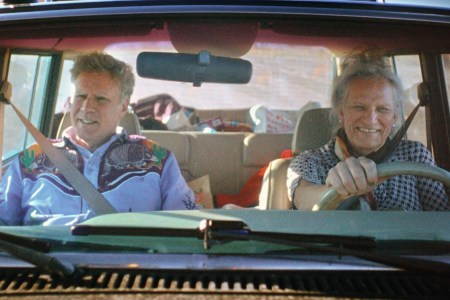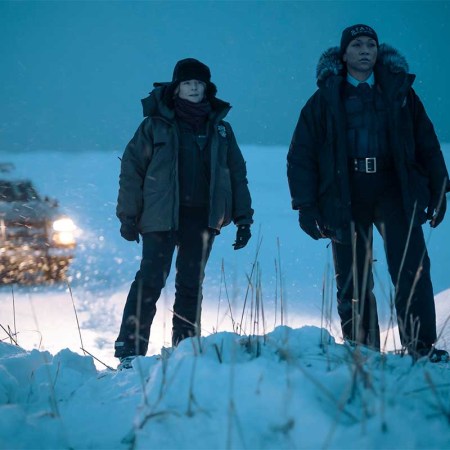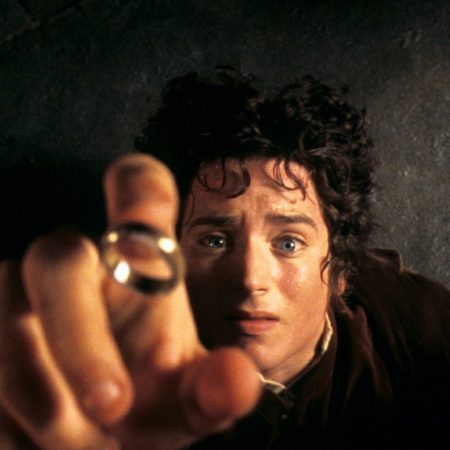In the bleak midwinter, something magical happens at the movies. During those doldrums of January, February and early March when the ticket-buying public can only be drawn out of hibernation to the neighborhood multiplex for awards contenders, studios seize the opportunity to unload some of their least-liked titles at a time when they’ll reach the fewest eyeballs. (While recent years have provided plenty of counterexamples to this presumption, M3GAN-mania being the latest, enough executives still believe it that the doctrine becomes a sort of self-fulfilling prophecy.) These films are not necessarily the worst — though they sometimes are — but more specifically the ones that their distributors have no idea how to advertise. Such productions can be well-funded, and often boast stars in their leading roles. Somewhere along the way, however, they’re deemed insufficiently commercial and remanded to the no-man’s-land of the calendar where connoisseurs of “how can this even exist?”-type spectacle sniff for truffles of good-badness.
The early months of 2019 brought us Serenity, in which Matthew McConaughey and a blonde Anne Hathaway share a torrid Florida Keys affair de coeur until they discover that they’re both characters in a child’s video game; 2022 yielded Deep Water, which sees Ana de Armas serially cuckolding soon-to-be-real-life-boyfriend Ben Affleck so hard he murders Jacob Elordi, then goes back to playing with his pet snails. In this proud tradition comes another erotic thriller crawling on hands and knees along the line between transcendence and ridiculousness, the tremulously horny Miller’s Girl. From one scene to the next, a viewer may experience trouble discerning whether this is a merely stupid movie, an amusing specimen of semi-witting camp, or stealth coup of high-wire self-parody. Intended as a deliberate affect or not, the floridly overwrought dialogue comes chockablock with memorable, bizarre howlers more than worth the bafflement. “Books make longing seem romantic, but it’s awful,” narrates our protagonist, whose name is Cairo Sweet, in the opening minutes. “It’s greedy. And I wear longing like a fuckin’ veil.” Right, sure, sure — wait, what?
As if Oleanna had been hit in the back of the head with a brick, a forbidden flirtation charged by the imbalanced dynamics of the academy becomes a psychological battle of wills, inverting power’s relationship to age and gender in clumsy, confused, counterintuitive fashion. Grown men can be lechers, drawn to adolescents still accommodating and easily impressed enough to prop up the egos eroded by middle age. But that doesn’t exonerate the teenage girls, shown here to be hormone-crazed nymphets baiting these unsavory attentions, toying with their surrogate father figures until they wake up to the essential emotional immaturity of any adult eager to strike up with a kid. While leering fiftysomethings may be held hostage by their own desires for suppler flesh, in essence helpless, their barely legal seductresses are in total control. Early coverage has painted the film as a cautionary tale for the #MeToo era, an update of an age-old scandal for the age of cancelation. Yet its warnings, summed up almost explicitly in one late scene, seem to sympathize with their targets: have your fun, but be careful, because that hottie twirling her hair from the front-and-center desk is really out to get you.
He (Martin Freeman in rumpled professorial shirtsleeves) is the malcontent English teacher punching the clock at a high school in small-town Tennessee until he gets around to following up Apostrophes and Commas, his debut novel panned when not totally ignored by the critics, as his alcoholic shrew of a wife (Dagmara Domińczyk) loves to remind him. She (Jenna Ortega, who shot her role two months before Wednesday would make her too famous to say yes to a gig like this) is his bookish yet comely pupil, girlish in her knee socks and miniskirts while precocious in her jokes about the Gin Blossoms and predilection for Henry Miller. Could novice writer-director Jade Halley Bartlett make it any more obvious? The boundaries they cross — daily pre-class chats with four-letter candor, a shared cigarette, an extracurricular outing to a poetry slam where neither dares look down at their touching thighs — might as well be demarcated in Luminol. Even so, on the well-trod path to transgression and downfall, the destination means less than the fun to be had along the way.
Like so many college applicants, Cairo Sweet worries that her prospects may be limited by the lack of experience and hardship that comes with her suburban, upper-middle-class upbringing. (At least, so we’re told. There’s no sense of place, not at the school described as a podunk dead end despite its handsome private-funding interiors, nor in the town that consists of only three locations. Cairo Sweet lives in a mansion left empty by her parents, who she claims have abandoned their eighteen-year-old daughter to go be lawyers in Europe. Anyone hoping she has murdered them will be sorely let down.) She needs something real to happen to her, and so when she and the scruffy Mr. Jonathan Miller catch each other’s eye, it only takes some moderate nudging from her lewder bestie (Gideon Adlon, her chicken-fried accent so thick she appears to be drunk at all times) to set a temptation in motion.
They engage one another in a psychosexual game of chicken, bonding mostly over their shared passion for highfalutin language and mutual understanding that they are misunderstood. One scene affirms that there’s no writerly fantasy more intensely sensual than hearing your own words read back to you, as the two reveal that they have committed passages of each other’s royal-purple prose to memory. Another pushes their sexy brinksmanship to its limit, and the literary ego to a more literal-minded outlet: he tells her to write him a short story in the style of her favorite author, she turns in a vivid imagining of a tryst between them à la Henry Miller, then he cranks himself off while reading it in the privacy of his home office/shame shed. This is the film’s Showgirls pool hump, a display of untethered eros that hits a fever pitch dissolving the barrier between the tawdry and the ironic. As we watch Freeman having his way with himself from an obscured vantage behind him, their overlapping voiceovers dip in and out with snatches of florid obscenity; somehow, the only thing to rise above the din is the C-word, which both actors get the chance to enunciate with maximum crispness.
The 15 Best Films at the 2024 Sundance Festival
The road-trip movie is back in a big way this yearPerhaps, the film wonders, this might be feminism. As Mr. Miller breaks it off and Cairo Sweet turns against him, their ensuing he-said-she-said made thuddingly visual with fixed-point editing between contradictory testimonies, Bartlett gestures toward the same moral equation previously calculated by Fatal Attraction. Maybe she did some things she shouldn’t have, but they were only in response to his ethical breaches — chauvinists, philanderers and groomers beware. There was some nuance to Glenn Close’s character, however, a mentally fragile woman desperate for love, unable to comprehend why and how she’s been cast aside. From the outset, Cairo Sweet exhibits a creepy sense of meditation in her every choice, as if fully aware that the optics of the situation will allow her to toy with her quarry however she pleases. In Fatal Attraction, Adrian Lyne scared the bejesus out of married, male audiences with a chilling image of how volatile emotions can be, and how high the stakes can rise when they’re treated carelessly. Bartlett adds the backwards corollary that a man should be faithful for no other reason than girls are vindictive creatures, both naive enough to expect maturity from an adult man interested in a teenager yet precocious enough to consider him weak once he’s rejected her. Most villainously, she eventually turns on her only friend, lost in megalomania.
The central narrative ambiguity doesn’t hold together, but in that respect, it fits right in with everything else in the film’s shambolic second act. Cairo Sweet’s metamorphosis from virginal nerd to jailbait fetish model to scorned, wrathful angel of vengeance seems to transpire in the course of a few disjointed scenes, which also makes the non-ending feel abrupt and incomplete. During the few scenes after their parting of the ways, both Cairo Sweet and Mr. Miller’s verbiage hits a high of ostentation, the sort of self-serious rhapsodizing better confined to Xanga, LiveJournal and the like. Cairo Sweet in particular has a grasping bloat to her vernacular that plays like someone doing an impression of eloquence: “Heartbreak is a slow-motion car crash set to Mozart,” she says. “You know the one. The Requiem. It tastes like graveyard dirt. It smells like burning flowers. It feels like violence.” Mr. Miller all but becomes visibly tumescent when he mentions her use of “vituperative.” With her talk of “this banality, this falsity you wallow in” and “the felicity of youth,” it’s hard not to picture The Joker whenever Cairo Sweet is speaking.
But is the writing for these characters so overwrought because they’re an exceptionally overwrought pair of people, and if so, does that recast this film as a feature-length exercise in narrowly pitched comedy? The real thrill of winter-lull cinema lies in the not-knowing, and appreciating how the many wrinkles have not been ironed out by the overseers and focus-groupers with more pressing matters to attend to elsewhere. We should simply be grateful for what we have, namely, the rain-soaked encounter between the romantic leads ripped straight from an extremely canceled age-gap remake of The Notebook. Art, Marshall McCluhan said, is anything you can get away with; he was probably talking about an odd fish such as Miller’s Girl, a managerial oversight slipping through the cracks of the release calendar. It feels like it has snuck into being.
This article appeared in an InsideHook newsletter. Sign up for free to get more on travel, wellness, style, drinking, and culture.

























